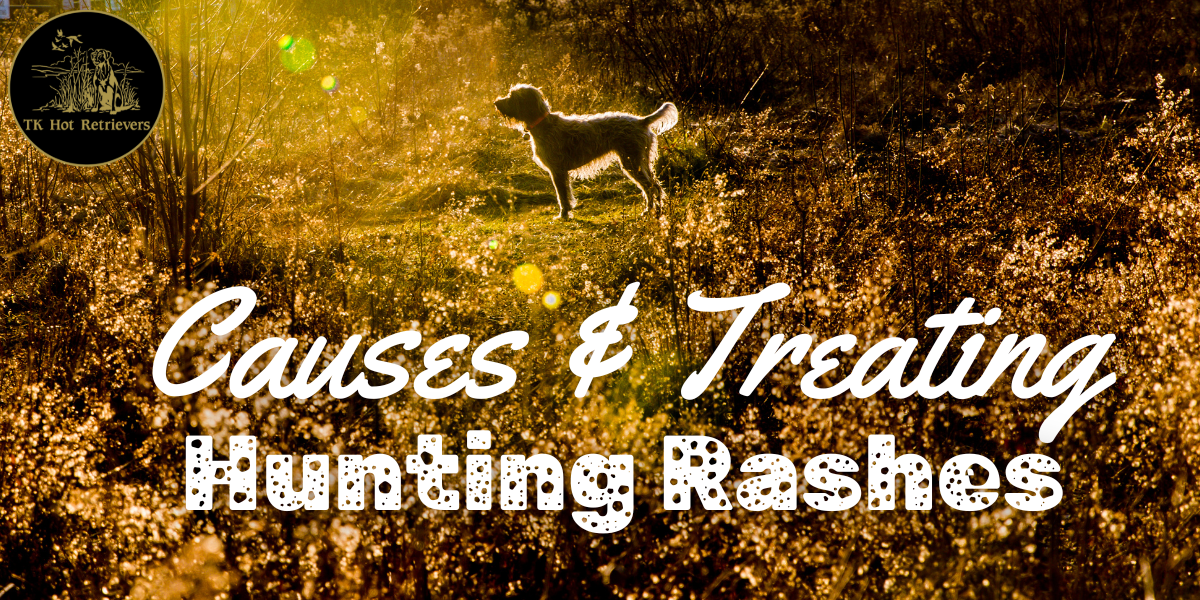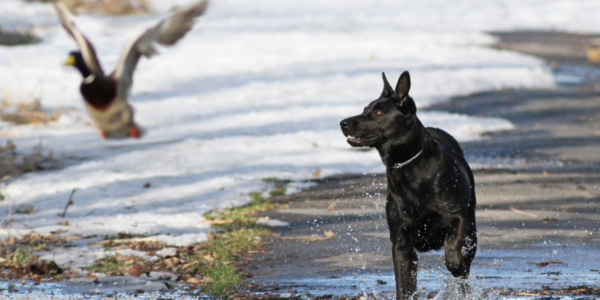Causes and Treatment for Rashes on Your Dog

As proud owners of hunting dogs, we understand the dedication and effort these loyal companions put into every adventure! Their boundless energy, sharp instincts, and unwavering loyalty make them exceptional partners in the field! However, their active lifestyle also makes them more susceptible to skin issues like rashes. Understanding the causes and treatments for rashes on your hunting dog can help ensure they stay healthy and ready for action!

Common Causes of Rashes in Hunting Dogs
Allergies
Hunting dogs often encounter allergens in their environments, such as pollen, grass, mold, and certain foods! Allergic reactions can lead to skin rashes, itching, and discomfort. Labradors, in particular, can be prone to allergies that manifest as skin issues.
Parasites
Ticks, fleas, and mites are common culprits behind skin rashes in hunting dogs! These parasites thrive in the woods and fields where your dog loves to roam. Their bites can irritate, leading to redness, swelling, and itching.
Environmental Irritants
Your hunting dog’s adventures expose them to environmental irritants such as thorny bushes, nettles, and insect stings! These can cause immediate skin reactions, resulting in rashes and inflammation.
Bacterial and Fungal Infections
Cuts and scratches from rough terrain can become infected with bacteria or fungi, leading to skin rashes. Hunting dogs are especially prone to these infections due to their active nature and frequent exposure to water and mud!
Contact Dermatitis
Certain chemicals found in cleaning products, grooming supplies, or even specific types of plants can cause contact dermatitis, which results in a rash after the skin comes into contact.
Identifying the Rash
Rashes present themselves in various forms, and recognizing the type of rash can help determine the cause and appropriate treatment! Check Fido for:
Red, inflamed patches: Often a sign of an allergic reaction or contact dermatitis.
Small, red bumps: Indicative of parasitic bites or environmental irritants.
Oozing or crusty lesions: May signal a bacterial or fungal infection.
Dry, flaky skin: This can be due to allergies or a reaction to an environmental factor.
Treatment Options
Consult Your Veterinarian
The first step in treating any rash is to consult your veterinarian! They accurately diagnose the cause of the rash and recommend appropriate treatment. This may include allergy testing, skin scrapings, or other diagnostic measures.
Medications
Depending on the cause, your vet may prescribe medications such as:
Antihistamines or corticosteroids: To reduce allergic reactions and inflammation.
Antibiotics or antifungals: For bacterial or fungal infections.
Flea and tick preventatives: To address and prevent parasitic infestations.
Topical Treatments
Topical treatments like medicated shampoos, creams, and ointments can relieve and aid healing. Look for the Veterinary Formula Clinical Care Medicated Shampoo; pet parents rave about the efficiency and effectiveness of this home treatment!
Home Remedies
For minor rashes, some home remedies can offer relief:
Oatmeal baths: Soothe irritated skin.
Aloe vera gel: Provides cooling relief and promotes healing.
Coconut oil: Moisturizes and has antimicrobial properties.
Preventive Measures
Preventing rashes involves regular care and vigilance:
Routine grooming: Regular baths and grooming help remove potential irritants and parasites.
Check for parasites: After each outing, check your dog for ticks, fleas, and other parasites.
Balanced diet: A high-quality diet supports overall skin health.
Safe environment: Minimize exposure to known allergens and irritants.
Keeping Your Hunting Dog Healthy
By understanding the causes of rashes and how to treat them, you can ensure your hunting dog remains in top form, ready to tackle any challenge! A happy, healthy hunting dog creates a successful and enjoyable hunting experience. So, stay attentive to their needs, provide prompt care, and enjoy the great outdoors with your loyal companion!
Check out these related blogs for more healthy hunting tips!
Benefits of Massaging Your Dog